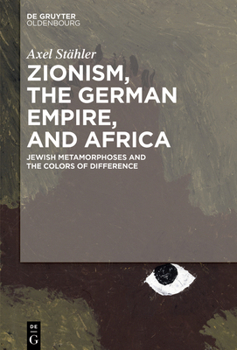Zionism, the German Empire, and Africa: Jewish Metamorphoses and the Colors of Difference
Zionism, the German Empire, and Africa explores the impact on the self-perception and culture of early Zionism of contemporary constructions of racial difference and of the experience of colonialism in imperial Germany. More specifically, interrogating in a comparative analysis material ranging from mainstream satirical magazines and cartoons to literary, aesthetic, and journalistic texts, advertisements, postcards and photographs, monuments and campaign medals, ethnographic exhibitions and publications, popular entertainment, political speeches, and parliamentary reports, the book situates the short-lived but influential Zionist satirical magazine Schlemiel (1903-07) in an extensive network of nodal clusters of varying and shifting significance and with differently developed strains of cohesion or juncture that roughly encompasses the three decades from 1890 to 1920.





